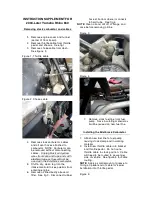
The Personal Safety System provides an
improved overall level of frontal crash
protection to front seat occupants and is
designed to help further reduce the risk of
airbag-related injuries. The system is able to
analyze different occupant conditions and
crash severity before activating the
appropriate safety devices to help better
protect a range of occupants in a variety of
frontal crash situations.
The Vehicle Personal Safety System consists
of:
•
Driver and passenger dual-stage airbag
supplemental restraints.
•
Front seat outboard safety belts with
pretensioners, energy management
retractors and safety belt usage sensors.
•
Driver seat position sensor.
•
Front passenger sensing system.
•
Passenger airbag off and on indicator
lamp.
•
Front crash severity sensors.
•
Restraints control module with impact
and safing sensors.
•
Restraint system warning light and
backup tone.
•
The electrical wiring for the airbags, crash
sensors, safety belt pretensioners, front
safety belt usage sensors, driver seat
position sensor, front passenger sensing
system and indicator lights.
How Does the Personal Safety System
Work?
The Personal Safety System can adapt the
deployment strategy of the safety devices
according to crash severity and occupant
conditions. A collection of crash and
occupant sensors provides information to
the restraints control module. During a crash,
the restraints control module may deploy the
safety belt pretensioners, one or both stages
of the dual-stage airbags based on crash
severity and occupant conditions.
40
MKC (TME) Canada/United States of America, enUSA, Edition date: 01/2016, First Printing
Personal Safety System™
















































